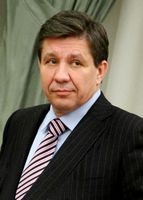Some Russian defense news from Tuesday, April 24 . . .
Deputy Prime Minister Dmitriy Rogozin generated a good bit of news during his visit to the Urals last week. It’s hard to keep up with him. In a sense, it’d be a real shame if he’s not in the next government.
Krasnaya zvezda published a wrap of his remarks.
Rogozin indicated Russia will demand the best new weapons from its OPK, not “metal hulks” that are soon scrapped. He laid out his reasons for not buying foreign armaments. And, he says, Russia doesn’t want to be China, blindly copying foreign models. But he said his country still wants ideas and technology, if not a lot of hardware, from abroad.
Rogozin blames Russia’s space launch woes of the weakness of its “element” or component base.
RIA Novosti reported his assessment that Russian military electronics lag foreign developments by 5-12 years. Russia doubled its investment in electronics last year according to Rogozin.
But back to KZ . . . it gave this interesting Rogozin quote:
“Russia must no longer be a hydrocarbon partner, it’s time for us to become an industrial power [hasn’t this time passed?]. We could have become such a power in the last century. Now it’s important to overcome the gap in Russia’s history. If business won’t participate in the country’s development, then we won’t achieve anything.”
In some non-Rogozin stories . . .
Militaryparitet.com cited a blog citing Interfaks to the effect that Kurganmashzavod will not be asked to renew production of BMP-3s for the army despite earlier indications it would. The item notes the President’s polpred in the Urals saying the army has also declined to buy the BMD-4M.
Mil.ru wrote about Ka-52 helo training at Chernigovka army air base in Primorskiy Kray. More than half the base’s pilots already practiced on the Ka-52 at the Torzhok training center. Chernigovka will be completely reequipped with the new helo this year, according to the Defense Ministry website. The “intensity” of flight exercises at the base doubled over the last year and increased 45 percent in the first three months of 2012.
Mil.ru also mentioned the completion of LRA training in the Far East. There were 40 bomber flights and ten cruise missile launches on the Litovka range according to the Defense Ministry.
Vzglyad citing Interfaks reported on Irkut’s president saying the company will make a combat version of the Yak-130 trainer. It will have greater thrust and be intended for Russia and for export.
Last, an update on the Belevitin corruption case. Former GVMU chief, Aleksandr Belevitin faces malfeasance and bribery charges that could net him a total of 22 years in prison. Pretty harsh by Russian standards. The state is also seeking 51 million rubles in damages from him. His defense is still examining the prosecutor’s case against him. Recall the state believes he and his deputy took bribes in return for procuring overpriced MRI machines from a foreign firm.




